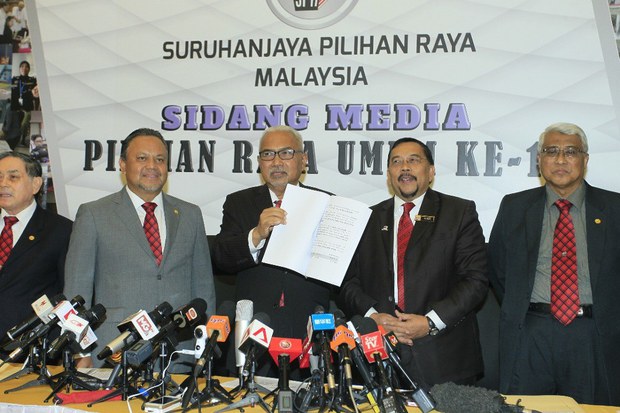Malaysia Will Hold General Election on May 9
2018.04.10
Kuala Lumpur
 Malaysian Election Commission Chairman Mohd Hashim Abdullah (center), shows the notice of the dissolution of parliament while announcing a general election for May 9, during a press conference in Putrajaya, April 10, 2018.
Malaysian Election Commission Chairman Mohd Hashim Abdullah (center), shows the notice of the dissolution of parliament while announcing a general election for May 9, during a press conference in Putrajaya, April 10, 2018.
Updated at 1:49 p.m. ET on 2018-04-10
Malaysian voters will go to the polls on May 9, the Election Commission (EC) announced Tuesday, as Najib Razak's ruling Barisan Nasional (BN) coalition seeks to retain power in the face of a major challenge from an opposition alliance led by ex-Prime Minister Mahathir Mohamad.
In setting a mid-week date for Malaysia’s 14th General Election, the EC announced that the nomination date for candidates would take place on April 28 – kicking off 11 days of official campaigning – and absentee ballots known as postal votes would be due on May 5. Commission Chairman Mohd Hashim Abdullah announced the dates after leading a special meeting at the commission’s office in Putrajaya.
The EC had to pick May 9 after considering several factors, Mohd Hashim told BenarNews.
“The campaign period will be too short if we pick May 7 for election and Sunday, May 13, has been associated with the darkest history in our country and we try to avoid the date,” he said.
The commission head was referring to race riots in 1969 that crippled the nation and led to a general election being postponed after the government declared a state of emergency.
He said the May 9 date would also give voters who are far from electoral areas where they are registered ample time to plan to travel home for the election. Malaysian voters living in southern Thailand, Singapore, Brunei and Kalimantan province, Indonesia are not eligible for postal votes and must return to cast ballots.
The announcement that a mid-week vote would follow a relatively short campaigning period drew complaints from opposition and civil rights groups, who said the schedule would favor Najib’s coalition and lead to a low turnout at the polls.
“Not only is the campaign period only the minimum 11 days, but the polling day is on a Wednesday, a working day and a school day,” electoral reform group Bersih said in a statement.
In recent weeks, Bersih and other groups have complained about efforts by Najib and his supporters to strengthen BN’s power leading up to the vote. Those efforts, they said, included the redrawing of electoral boundaries and pushing through a bill in parliament to punish people who spread “fake news” despite opposition claims that BN would use it to punish Najib critics.
Meanwhile, Mahathir said that the EC’s action would make it difficult for 500,000 Malaysians who work in Singapore to exercise their voting rights.
“I hope voters will make a proper plan so that they can vote in this coming general election,” Mahathir told reporters.
Mohd Hashim reminded employers to allow their Malaysian employees the time needed to exercise their right to vote, or face a penalty.
Malaysia Airlines and its sister airlines, Firefly and MASwings, announced that they would waive flight-change fees to those who booked flights to vote on May 9. The waiver is applicable for all tickets for travel dates between May 8 and 10, but must be booked within the next 10 days, the airline announced.
In addition, grassroots efforts are springing up to help people get to the polls. Twitter accounts have been set up featuring the hashtags #CarpoolGE14 to match passengers with drivers to get them to the polls; and #PulangMengundi (#ReturnToVote) to offer financial assistance to those traveling home to vote.
Previous weekday elections
Meanwhile, a BN official said that the decision to hold the vote on a Wednesday was fair, adding there was historic precedence. Strategic communications deputy director Eric See To said not all Malaysian states considered their weekends to be Saturday and Sunday.
The election in 1992, when Mahathir served as prime minister, was on a Thursday and elections in 1995 and 1999 were held on Mondays, he noted.
A weekday election should not be an issue, according to Azmi Hassan, a political analyst at Malaysia’s Technology University.
“Whether it’s on working day or not, it will still affect both BN and PH,” he told BenarNews, referring to the opposition Pakatan Harapan coalition.
Tuesday’s announcement occurred within 24 hours of all 12 states officially dissolving their state assemblies and days after Najib announced the dissolution of parliament to clear the way for the election.
Najib, 64, the eldest son of Malaysia’s second prime minister Razak Hussein, is leading the nation’s oldest ruling coalition against his mentor, Mahathir, 92, who leads the new coalition in what could be the toughest election in the country’s 60-year history.
The two had a falling out that saw Mahathir leave the ruling coalition in 2016 to create a new party and align with other opposition parties with the aim of unseating Najib.
The coalition that wins a simple majority of 222 parliamentary seats will form the government. In the 2013 election, the opposition coalition won 52 percent of the popular vote but Najib and his alliance maintained power by winning 133 parliamentary seats.
For the past three years, Najib has been linked to a scandal involving billions of dollars allegedly stolen from the state development fund known as 1Malaysia Development Berhad. The prime minister has denied committing any wrongdoing even as foreign governments, including the United States, have sought to recover funds.







